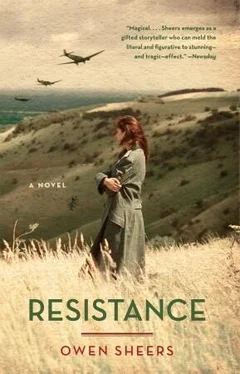The blackout regulations had stopped them all whitewashing the outside walls of their homes, but in the years following Roderick’s death Edith stopped cleaning hers too. The Gaer’s brightness dulled with mildew and mould. The little garden of rhododendrons and azaleas, fenced in from the sparse hillside, grew wild. The slates slipped and skewed in the gales, leaving the roof a crossword puzzle of dark square gaps. Edith’s defences, once as strong and deeply rooted as those of the fort above her, collapsed under the weight of Roderick’s death, just as those of the fort had disintegrated under the weight of time.
One day William was bringing his flock off the mountain when he found Edith wandering through the bilberry bushes, barefoot, her hair wild and her hands black with the peaty soil. She’d been following Roderick’s voice, she told him. He was out on the mountain and she had to find him. She had to bring him home. Ever since then they’d made sure someone visited Edith every day. She was still fiercely independent and wouldn’t hear of moving down into the valley. With her boys gone Maggie would have had room for her. And Mary too. But Edith wouldn’t leave The Gaer. They were retreating into the hillside together, she and the cottage, sinking back into the soil. She still managed to feed herself, tended her small flock, kept a sow she offered to William’s boar every autumn. But she’d become wild in other ways. One night a couple of days after William found her ranging the hillside, Sarah took her turn to stay over at The Gaer. In the middle of the night she’d been woken by Edith’s voice drifting up the stairs. When she’d gone down to investigate, feeling her way through the dark cottage with her hands along its walls, she’d found Edith in her nightdress in the living room, a single candle throwing a weak, flickering light over the lettered board on the table in front of her. When Sarah had spoken her name, “Edith?” she’d knocked the upturned glass to the floor and started like a frightened pony, white-eyed and ready for flight. To this day none of them could work out how she’d got that board. Maggie said it must have always been there, in the cottage, that there was a lot of that stuff around after the Great War. She told Sarah that after the Somme she remembered sermons being preached down at Longtown discouraging a rash of desperate forays into the occult. It was the devil’s work, the minister had told them, knuckles white over the edge of the pulpit, this twisting of grief. But still, Maggie said, she’d known of young women all over, up all night using boards, cards, even psychics, trying to speak to the ghosts of their dead husbands, sons, and fathers.
“What’s to say they won’t be back tonight? They’ve only been gone a few hours, haven’t they?”
And now here they were, holding their own kind of séance for their own lost men; trying to conjure a reason for their leaving from the spaces they’d so suddenly left in their lives.
“Well, Maggie?” Mary continued. “What makes you so sure? Did William say anything?”
“No,” Maggie replied, shaking her head and sighing again. “No, he didn’t say anything.”
There was something in Maggie’s tone, the slightest of inflexions over the way she’d said “say” that made the other women expectant. Mary stopped her questioning and all of them looked at Maggie, silently asking her to carry on. Maggie looked back at each of them in turn as if making a calculation, weighing their responses. Eventually, under the weight of their shared gaze, she stood and went over to the dresser once more. This time she pulled a pamphlet from the middle drawer.
“But I did find this. Just now when I came back to milk the cows.”
She dropped the pamphlet on the table in front of Mary. Sarah came over from the window and looked over Menna’s shoulder, her hands on the back of the chair. The pamphlet had a dull brown cover with the same typeface as the “Stand Fast” leaflet. The title, which they could just make out under smears of mud and a hole torn at its centre, curved around some illustrations of tools; a hoe, a plough, and a spade: “The Countryman’s Diary—1944.”
“It was in the milking shed,” Maggie said. “On the floor. I only saw it because one of the heifers was standing on it.”
Mary opened the cover and turned the first few pages. Maggie sat back down. She looked beaten, deflated. Whatever had been holding her firm from within had buckled and sagged.
“Stupid bugger must have dropped it. What chance has he got if he can’t even keep hold of that?” she said, looking out the window.
As Mary turned the pages Sarah caught glimpses of headings, diagrams, and snatches of text:
SILENT KILLING … insert the knife an inch below the ear and twist … DELAY MECHANISMS I. The Time Pencil.… The Time Pencil looks rather like a propelling pencil. One end is copper, the other brass.… TARGETS I. Shell and Bomb Dumps.… IV. Semi-Tracked Vehicles.… Fix a charge of 2lb Gelignite at any of the following points.… I. The Pull Switch.… The pull switch is designed so that when a wire fitted to the eye at the end is pulled, a cap is fired.… OB Maintenance … ensure to keep all vents clear of debris.… Escape Routes.… In the event of hostile intrusion …
All of them were silent as Mary carried on turning the pages. It was not a thick pamphlet and she soon came to the last one, closing it to reveal the innocuous cover once more: “The Countryman’s Diary—1944.”
Maggie spoke first. “That’s why I think they might not be back today. Or tomorrow.”
“How …?” was all Menna could manage.
Sarah sat down at the table again. “It isn’t possible. Tom never had the time.…”
“I know, bach,” Maggie said. “I know. But there it is.” She looked at the other three women. Each of them looked as if they’d been slapped. The blood was shallow beneath their cheeks and they looked numb, lost in their thoughts, retracing days, nights, any scrap of time their husbands hadn’t been home or on the farm.
“I thought he had a woman,” Mary said at last, looking straight ahead, her eyes unfocused. “Over in Llanthony or down in Longtown. That barmaid at The New Inn. I thought it might be her.”
Maggie gave Sarah a beseeching look. Come on, girl, help me now. Now you know. Help me with this. But Sarah’s eyes were also distant, staring out the window.
“I’ll get some cake,” Maggie said, standing from her chair and wiping her eyes. “Why don’t you put the kettle on, Sarah? Mash us some more tea, bach?”
It was well into the afternoon when the women left Maggie’s kitchen, each of them walking back to their farmhouses, loosened by the resonance of that pamphlet dropped onto the table like a pebble thrown into the still waters of their lives. Their husbands had not been who they thought they were. At least, not this last year. Or had it been for longer than that? They didn’t know. All they did know was that the men had left; that they had been left. That if “The Countryman’s Diary” was anything to go by, the men had left the valley because of the invasion edging north from the southern coast. They had left to perform their duties, their secret duties. To sabotage, to kill (Sarah remembered the first time she’d seen Tom stick a pig, the resolute way he’d worked the knife into its throat … insert an inch below the ear …), and then to disappear. It was unthinkable. None of them were fighting men. William was in his late fifties and Hywel and Reg couldn’t have been far behind him. Malcolm walked with a limp, dragging his club foot like a ball and chain. Jack, Tom, and John were younger, it was true, but they’d been farmers all their lives. They’d hardly ever left the valley except for the market or the occasional farm sale. Sarah could count on one hand the nights Tom had spent away from the farm. They were not soldiers.
Читать дальше












